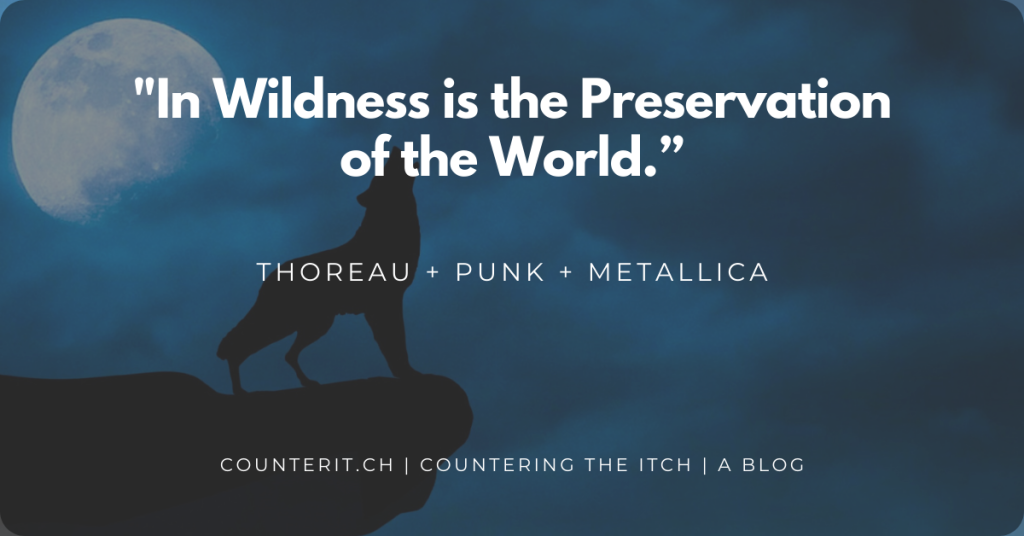
My beloved Ol’ Lady1I’m referring to Maggie, my vintage 1100cc/122+hp/4-cylinder motorcycle. and I visited Geneva State Park up on the North Coast at Lake Erie recently. Upon our arriving at the Lodge at Geneva, which I thought was near the entrance to the beach, I asked the front desk staffers about walking directions to the beach. One staffer said she likes to recommend to guests to drive from the hotel to the beach. But, I asked if I could just walk to it. She said, “sure, it’s just two miles away along the trails.” I said, “two miles!?” And she said, “well, you will at least have a peaceful walk,” and gave me a little trail map.
Without delay, I walked the four miles total, to and from the beach. While doing so, I had time in the woods and the wild to consider Thoreau’s essay “Walking,”2Also referred to as “The Wild.” and how it relates to Metallica’s song “Of Wolf and Man.”
Essentially, the writings and speeches of Henry David Thoreau – best known for the book Walden; or, Life in the Woods and essay “Civil Disobedience” – influenced some (perhaps many) punk bands of the 1970s and 1980s, and of course the thrash metal band Metallica.
For instance, consider the following:
Punk and Thoreau
Per the blog post, “Walden Pond Punk: Henry Thoreau and the Punk Rock Aesthetic:”
The punk of Thoreau, the transcendental punk whose lineage runs throughout American history, is not the stereotyped punk of spiked hair, tattered clothes, anarchy symbols spayed across leather jackets, mosh pits, slam dancing, and loud, fast, riveting guitar rock. It’s the punk of individual liberty, authenticity in the sense of self, and the rejection of conformity amidst a mindless society.
And, the blog post ends with this:
Finally, in a bit of insight reminiscent of my former colleague’s advice to his students, Black Flag front-man Henry Rollins explains, “Punk isn’t about mohawks or studded leather – it’s about resistance to tyranny in any form.” Nothing could better describe America’s original punk, Henry David Thoreau.
Moreover, back in May 2017, Michael Mazenko wrote as a guest opinion columnist for the Denver Post a short message for high school seniors who were about to graduate titled, “A Message for Today’s Graduates from Henry David Thoreau (and Punk Rock).” The message is only a few paragraphs and it also has an audio feature whereby one can just listen to it (if one doen’t have three minutes to read it).
Here’s a snippet:
Regardless of where you go and what you do, don’t let people fence you in. Don’t let the world put boundaries on you. The contemporary world is one of standardization in which society and consumer culture seek to maximize efficiency by making everyone the same. We will all eat at the same restaurants and listen to the same music and watch the same shows and wear the same clothes and study the same subjects and take the same tests. So whenever you can, don’t let people limit you.
Thoreau’s “Walking”
The punk blog post also mentioned Henry David’s speech from 1851 that he ultimately turned into an essay titled “Walking,” which was published in Atlantic Monthly in 1862 after his death:
[…] Today, wilderness is usually considered to be something good and in need of preservation. The beauty and awesomeness of it dominate our attention.
The West of which I speak is but another name for the Wild; and what I have been preparing to say is, that in Wildness is the preservation of the World. Every tree sends its fibers forth in search of the Wild. The cities import it at any price. Men plow and sail for it. From the forest and wilderness come the tonics and barks which brace mankind. Our ancestors were savages. The story of Romulus and Remus being suckled by a wolf is not a meaningless fable. The founders of every state which has risen to eminence have drawn their nourishment and vigor from a similar wild source. It was because the children of the Empire were not suckled by the wolf that they were conquered and displaced by the children of the northern forests who were.
Metallica’s “Of Wolf and Man”
Compare those lines and concepts from “Walking” with the lines and concepts from Metallica’s song, “Of Wolf and Man:”
[Bridge] I feel a change, back to a better day (Shapeshift) Hair stands on the back of my neck (Shapeshift) In wildness is the preservation of the world So seek the wolf in thyself
The third line of the bridge is taken directly from Henry David’s “Walking,” and so is the overall gist of the song’s meaning.
Music Video
Interpretations
“Walking”
It could be considered a transcendental essay that analyzes the relationship between man and nature, trying to find a balance between society and our raw animal nature.3I read this somewhere on the Interwebs and it seems to make sense.
Another perspective of the meaning of the essay comes from a blog at UMass titled “Walking with Henry David Thoreau.”
For Thoreau [the act of walking] was a philosophical exercise. Walking was a way to merge with nature, it was purification of the self. For Thoreau, it is society that leads humans astray. In contrast, “true freedom is found in nature.”
And, lastly, there’s “Thoreau’s ‘Walking’ Major Themes” from CliffsNotes that goes on to state the following:
[…] Thoreau more starkly depicts the polarization of nature and civilization as a struggle between the forces of good and evil….”
“Of Wolf and Man”
Sometimes it’s helpful to understand aspects about the lyricist to help interpret a song’s lyrics. Just briefly, James Hetfield – the lead singer, co-founder, and rythym guitar player of Metallica – embodies the spirit of Thoreau in many ways:
- He put almost all of his 1,150-acre parcel of land known as Luiz Ranch into a conservatorship to prevent it from ever being developed commercially (outside of ranching/agriculture).
- He left the San Francisco Bay Area to move to a remote home in Vail, Colorado to be closer to nature.
- He’s an avid beekeeper.
- He’s into hunting and even narrated “The Hunt,” which is an eight-episode series on The History Channel “that documents one of the most dangerous pursuits known to man.”
With that as pretext, here’s a decent interpretation by mullett2k at SongMeanings:
The song is saying that the Earth’s gift is the primal instincts that we have and that our human ability to think/reason isn’t what is important, it’s just a facade, and what truely keeps us alive is our primal instincts, so in that sense, we’re the same as a wolf. He goes beyond that to say that being a wolf is better than being a man. When he begins to shape shift back into a wolf he says “I feel I change BACK TO A BETTER DAY” the next line says “Hair stands on the back of my neck”. So the better day is when he’s a wolf and his senses are CLEAN and visceral, not cloudy by unimportant human thought. When the shape shifting occurs, the senses become clean and and the movements become “swift” and deliberate, moving towards the primal and simple goal of catching the lamb.
Also, over at Camilla’s English Page blog, Camilla and her dad point out – somewhat through a Socratic method of rhetorical questions – a connection to the book The Call of the Wild by Jack London, Thoreau’s “Walking,” and Descartes’ “I think therefore I am,” among other subtleties such as “shapeshifting.”4“So seek the wolf in thyself.”
[Verse 3] Bright is the moon, high in starlight Chill in the air cold as steel tonight We shift, call of the wild Fear in your eyes It's later than you realized
In light of Jack London’s novel, The Call of the Wild, the central character of the story is a dog named Buck, who looks like a wolf.
Again, from Wikipedia:
The story opens at a ranch in Santa Clara Valley, California, when Buck is stolen from his home and sold into service as a sled dog in Alaska. He becomes progressively more primitive and wild in the harsh environment, where he is forced to fight to survive and dominate other dogs. By the end, he sheds the veneer of civilization, and relies on primordial instinct and learned experience to emerge as a leader in the wild.
Even more to the point I’m making, and as this short summary of the book explains (spoiler alert follows), Buck began to feel the “call of the wild” and his primal instincts to hunt. He ultimately joined a pack of wolves, returning to his roots and the nature from which he came, becoming free once again.
Accordingly, we can also deduce that Hetfield has read a few books in his day, too.
Closing Words
So, do you also think the song is directly related to the essay “Walking,” the book The Call of the Wild, and the lyricist’s personal interests and attraction to nature and the wild?
Footnotes
- 1I’m referring to Maggie, my vintage 1100cc/122+hp/4-cylinder motorcycle.
- 2Also referred to as “The Wild.”
- 3I read this somewhere on the Interwebs and it seems to make sense.
- 4“So seek the wolf in thyself.”

